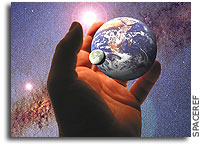 In the absence of a Creator a number of people have taken to worshipping the next best thing, creation itself. This phenomenon has been exemplified by the rise of Gainism and the Gaianists. Given the poor state of the environment today this sentiment has mutated into the kind of reverential desperatism and misanthropism that is now the all too familiar opium promoted by the deep ecologists. God may be dead, but religious sensibilities that showcase the unworthiness of man have been retained by these radical environmentalists, resulting in a worldview that perpetuates defeatism, shamefulness and self-loathing.
In the absence of a Creator a number of people have taken to worshipping the next best thing, creation itself. This phenomenon has been exemplified by the rise of Gainism and the Gaianists. Given the poor state of the environment today this sentiment has mutated into the kind of reverential desperatism and misanthropism that is now the all too familiar opium promoted by the deep ecologists. God may be dead, but religious sensibilities that showcase the unworthiness of man have been retained by these radical environmentalists, resulting in a worldview that perpetuates defeatism, shamefulness and self-loathing.The deep ecologists and Gainists ascribe divine status to nature—a kind of neo-pantheism--and like their religious forbearers, have insisted on keeping humanity outside the gates of heaven. In their view, man is dirty, irreverent, and profane. His sheer presence is an affront to the divine processes of nature, the very cause of paradise lost; terms like ‘biodiversity’, ‘symbiogenesis’, ‘biosphere’, and ‘homeostasis’ have replaced the old religious canons.
The Earth, they would argue, would be better off without the meddling of humanity and their omnipresent disruptive technologies. The deep ecologists are on a self-prescribed mission to recover paradise and turn the Earth into a giant nature preserve where the only observers would be those creatures trapped in endless cycles of mindless selection and procreation. Birth, life, death, birth, life, death—the perpetuation of the Darwinian cycle as an end unto itself, a cycle with no other purpose than to satiate the aesthetic sensibilities of the nature worshippers.
But there is a cure to the new quasi-religious environmentalist fervor: humanism. And it doesn’t matter what kind of humanism, be it secular humanism, Christian humanism, Buddhist humanism, or transhumanism. Even better are those humanistic codes, like Buddhism and transhumanism, which are nonanthropocentric and demand the respect of all life. Humanist sensibilities work to ensure that it is the quality of life that is maintained rather than pseudoscientific and quasi-religious abstractions.
One can be an environmentalist and a humanist. The key is to make this planet habitable, sustainable and humane. It is this last crucial point that the Gainists and deep ecologists have failed to grasp, and in so doing, have come to represent a dangerous and misguided ideology.
Tags: environmentalism, radical environmentalism, deep ecology, misanthropy, humanism.

No comments:
Post a Comment